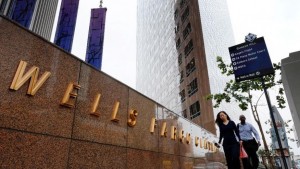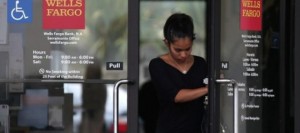-

A downtown building is reflected in the windows of the Wells Fargo Bank in Los Angeles on Tuesday, May 5, 2015. The city of Los Angeles is suing Wells Fargo Bank, alleging that employees driven by strict sales pressure opened unauthorized accounts for customers that charged them fees and damaged their credit. (AP Photo/Richard Vogel) (The Associated Press)
Wells Fargo is the third largest bank in America (by assets) and is worth over two-hundred-eighty-seven-billion-dollars. On May 5th 2015, the city of Los Angles filed a law suit against the fortune-five-hundred company suing Wells Fargo for fraud. Wells Fargo, known for swindling individuals into signing up for unneeded credit cards, has the reputation to cross sell to its customers. Stealing customer’s money, Wells Fargo funded additional customer accounts, rather than keeping the money. The workers signed its consumers for unauthorized credit cards, creating ghost accounts to meet sales quotas imposed by branch, district and regional managers.
The owners of the branch, including managers and workers saw nothing wrong in what they were doing. These thieves thought neither of the Wells Fargo’s “valued” customer, or the ethics and morals they burned. It seems the branch executives failed to balance “social responsibility” with “[making] as much money as possible, [unable to] conform to the basic rules of society… embodied in law and… ethical customs” (Corporate Ethics and Corporate Governance, Milton Friedman 174/175).

A disappointed customer walks out of Wells Fargo after figuring out money has disappeared from their bank account.
By using their clients, stealing their money and then failing to return it without any questions, Wells Fargo creates a mistrust and redefines the word ethics. The billion dollar company broke social links, trust and made people wonder: “Is Wells Fargo reliable? Can we trust them with our hard earned money? Will they deceive us again, and then hide it until a victim or bystander sees?” All of these questions will float in the air from now onward. That is the Wells Fargo way.
-